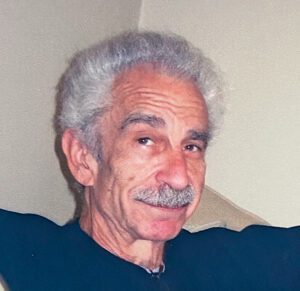 1935–2023
1935–2023
Born in Queens, New York, Eric graduated from PS144 high school in 1952 at age 16 and Queens College in 1956 where he majored in psychology and captained the tennis team. His childhood home served as a refuge and waystation to family and friends fleeing the Holocaust, giving young Eric the international, cultured, and above all humanistic outlook that remained with him throughout his life. Infusing both his personal life and his professional work, this caring attitude won him the respect and affection of all he met and had a profound influence that continues to this day through the achievements of the people whose lives he touched. A lifelong tennis player and accomplished artist, as a child Eric was selected by the Museum of Modern Art to join painting classes with famous artists as mentors. His enduring art, often political in nature, includes drawings, paintings, charcoal portraits, and multimedia pieces. He attended graduate school at the University of Michigan, obtaining MA and PhD degrees in personality and clinical psychology in 1957 and 1963, respectively. He joined the University of Michigan Department of Psychiatry in 1965 and the Department of Psychology in 1973 after completing a Master’s in Public Health.
Professor Bermann served in a number of clinical supervisory capacities: as chief psychologist for Children’s Psychiatric Hospital at Michigan Medicine, and consultant for the Grand Rapids Child Guidance Center, the Detroit Neuropsychiatric Institute, the Ann Arbor and Willow Run public schools, and the Washtenaw Intermediate School District Detention Home. He also held national advisory roles in the American Association of Psychiatric Clinics, National Institute of Mental Health, American Psychological Association (APA), and State of Michigan Licensing Board to encourage standards for licensing clinicians.
As a master of creating change without seeking the spotlight, Dr. Bermann’s understated brilliance led to major advances in the practice and teaching of family-based therapy. Perhaps his most lasting contribution, as Chair of the Clinical Psychology graduate program and director of clinical training for 13 years, Eric saw the need to expand beyond the program’s psychoanalytic framework to include community psychology and family systems thinking in students’ training. Systemic change is slow, and it took years for the program to embrace broader constructs for understanding psychopathology and mental health. When the University lagged behind in providing training for students beyond psychoanalytic psychotherapy, Eric remedied this by hiring faculty with cognitive behavioral backgrounds and taught core courses introducing family systems and community mental health perspectives into the curriculum. In 1977 he was cofounder and president of the Ann Arbor Center for the Family, Inc. (AACF), a community clinic independent of the University that today remains an important and enduring example of successful collaborative work focused on family systems thinking. Students flocked to AACF, paid for their own training, and were supervised by psychologists, psychiatrists, and also social workers. Subsequently the University Center for the Child and Family was created where Eric also supervised many graduate students. Today the graduate program is firmly grounded in clinical science and evidence-based practices.
To further broaden the curriculum and to provide additional, diverse research opportunities, Eric hired a number of faculty from underrepresented groups and admitted many more students of color to the program. His efforts were recognized in 2005 with the APA Suinn Award for excellence in the recruitment, retention, and graduation of ethnic minority students. Having chaired 50 doctoral dissertations, Eric’s students have gone on to have their own successful careers as college president, provost, and deans, many holding research and academic positions at universities small and large, with generations of others carrying on the tradition of clinical work with families. In 2009 he was honored by APA with the Toy Caldwell-Colbert Distinguished Educator award in Clinical Psychology.
Eric was broadly known for his research on systemic factors related to psychopathology in children and their families. He engaged in a number of projects focused on illuminating the effects of violence and abuse in the lives of children, where he trained students in ways of evaluating systemic issues. From 1999–2003 he was co-PI of a longitudinal study funded by the Department of Health and Human Services ACYF on the effects of community, family and media violence in the lives of Head Start preschoolers. He was co-PI on a grant from the State of Michigan (1992–93) focused on in-home studies of child-abusing and substance-abusing families.
He also strove to create unique research opportunities for his students as co-PI of the University’s interdisciplinary training program in child abuse and neglect. His publications ranged widely: determinants of marital choice, family violence, family assessment, and family therapies, death fears, children at risk in substance-abusing families, and the impact on preschoolers of family, community, and media violence. Professor Bermann is well known for his award-winning book, Scapegoat: The Impact of Death-fear on an American Family. Through naturalistic observation of a family in situ, Eric uncovered a secret underlying their young child’s seemingly intractable behavior problems—a pending death in the family—thereby expanding our ways of thinking not only about child psychopathology but also of American culture surrounding death itself.
He retired in 2002 after forty years as a distinguished clinician, professor, supervisor, mentor, research investigator, and administrator in the Department of Psychology. He is remembered by many as a great mentor, a true friend, a brilliant yet humble scholar, and a beloved leader.
He passed away on June 10 of complications of vascular dementia and is survived by wife Sandra Graham-Bermann
and immediate family of stepson Kenneth E. Frazee and daughter-in-law Andra, stepdaughter Sarah M. Schomer and son-in-law Fred, as well as brother-in-law Robert Lieberman and his wife Janice. Father to Marc, Kara, Sol, and Ted Bermann, Eric had 11 grandchildren. Donations can be made to the Eric Bermann Graduate Student Research Award fund at https://donate.umich.edu/WwdNq.

